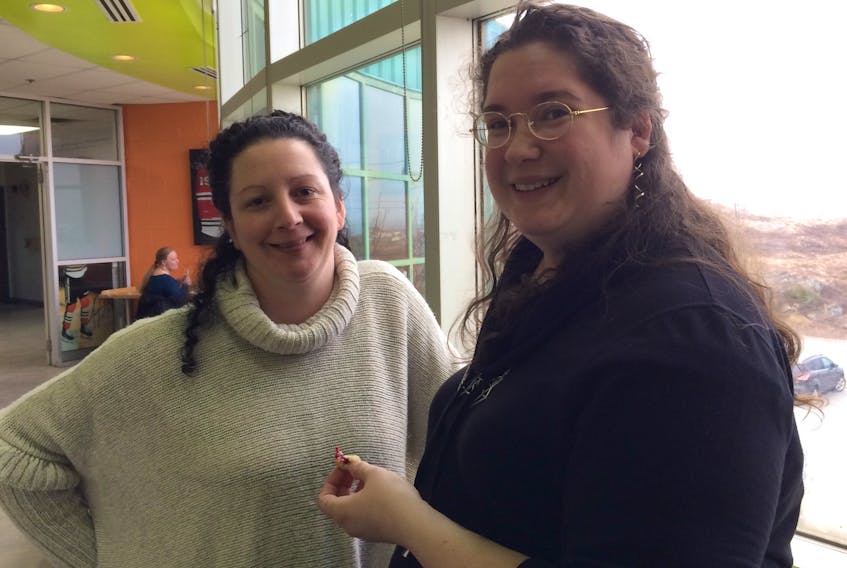CHANNEL-PORT AUX BASQUES, N.L. — Linda Hickey says she sees plenty of untapped tourism potential for the southwest coast of Newfoundland and Labrador.
Hickey, the program coordinator for Hospitality Newfoundland and Labrador (HNL), co-hosted a free information and training session at the Bruce II Sports Centre on April 30 to talk about trends in provincial tourism, and how it can help grow the region’s economy.
“I was fascinated with this community. You have so much to offer,” Hickey said to the dozen or so attendees, all of who were women, except one. “There are a lot of tourism opportunities here.”
As part of the presentation, Hickey and co-host Scott Penney cited some recent trends in provincial tourism, which includes growth in the number of Chinese tourists. Hickey says visitors are drawn to the province’s trifecta offering of icebergs, whales and northern lights.
While the southwest coast doesn’t usually see icebergs, there still remains opportunity to draw tourists, particularly as Channel-Port aux Basques serves as a key entry point to the province. Hickey cited authentic cultural and culinary experiences as key tourism draws, and told a story about a Bed and Breakfast owner whose shed parties have proven so popular that she’s closed the B&B to focus solely on those instead. And on Bell Island an annual Harry Hibbs accordion festival, which locals were initially skeptical about, saw 750 visitors in its first year. Eventually that number grew until additional ferry runs were necessitated to handle the 4,000 passengers.
Agri-tourism
One of the conference attendees was Melissa Samms, who is working to help grow agri-tourism in the Codroy Valley area.
“Agri-tourism is generating tourism and tourism dollars through the agricultural and food industry, so it’s a method of implementing agricultural practices, which is to say growing produce in an area, and then supplying it to tourists,” offers Samms.
The goal is to have a market or even a restaurant which would offer tourists and residents locally grown produce. And that doesn’t just mean farmed good, either. A producer making fresh berry jams in their kitchen would be able to take advantage to sell their wares too, for example.
The Codroy Valley did have a farmer’s market before, but when the funding dried up the market was forced to fold, says Samms. The original blueprint for that market included a produce market, secondary processing, a café and a gift shop.
Currently, Samms is helping to establish a teaching farm in the area, which will be featured in a documentary through Doc Talks.
“What that is, is just establishing gardens where we can to help teach each other, and especially young people in the communities, how to farm,” says Samms, whose primary role is facilitator.
“The average age of a farmer in Canada is like 56 or something. Like farmers are old and somebody’s got to replace them at some point.”
That’s currently a hard sell as a career option. In order to make it more attractive and viable for the younger generation farming has to become more profitable, which is why expanding into the growing tourism market can help.
“Hardly anyone wants to do it and for good reason. There’s no money in it,” says Samms. “You really have to love what you do. So what I would like to do, at least for the Codroy Valley farm, is to introduce an element of perma-culture to it, so that you can just set it and forget it.”
Samms estimates that will take anywhere from three to five years. She pointed out there are still plenty of creeping, wild strawberries growing in untended fields in the Codroy Valley, years after growers stopped actively tending that crop. Samms says an application seeking funding for this year is currently in the works.
“We’ll see what happens, but we have at least three or four people who are offering land,” she says.
“The money is always in secondary processing. So we need to not just grow things here, we need to process them. So like grow it in the Valley, process it in Port aux Basques or something.”
Competing against Airbnb
Meanwhile, bed and breakfast operator April Gillam is facing a different set of challenges to grow her tourist clientele.
Her parents own two B&Bs, but even in small-town Port aux Basques increasing competition from private Airbnb operators have begun to affect her bottom line. A quick internet search shows over a dozen private competitors, some of which are full homes, with prices ranging from $70 to over $200 per night.
“We’ve said ourselves, maybe we should just fold it up and do that,” admits Gillam. “It’s over 11 years we’ve invested into this business, and we do get a lot of people come from different places, and that’s the amazing part about it.”
Unlike bed and breakfasts, Airbnb operators do not pay any additional municipal business taxes or fees, and most don’t undergo inspections, have staff to pay or carry any liability insurance. As a result, they are cheaper to operate and have a higher profit margin.
Gillam says joining Bookings.com greatly helped her traffic, and they do get repeat clientele. She says she gets a lot of French Canadian tourists.
During the meeting, Gillam cited time and money as factors when it comes to offering some cultural experiences to entice more guests.
“Just to start a little tiny thing, that’s the whole thing that’s the problem for Newfoundland,” says Gillam. “We’ve got all these ideas but not enough people and not enough time to put into it.”
Gillam says finding the right people to work for minimum wage to help execute those ideas is a long-standing problem.
“You can’t afford to pay them more than that because the taxes on everything, and so that’s your main, main problem,” shrugs Gillam. “And trying to get anybody gung-ho into it like you are, you know?”
And since rental housing, particularly accessible housing, is an issue in the town, homeowners transitioning to Airbnb businesses affects more than just the guest accommodation operators.
Both Samms and Gillam also cited initiative as playing a role when it comes to expanding tourism opportunities.
“Dad’s got the land, he’s got the know-how, but he doesn’t have the funding or the time, so you have to have all of these things together in order to be able to do it,” says Samms. “But how do you encourage that?”
Samms says co-operative structures, similar to the Growing Our Futures Childcare Co-Operative, might be one way to solve the problem, and she will train this summer with the local credit union to learn more. She thinks it may be possible to establish an agricultural co-operative in the region.
“It would be perfect because you could delegate out the responsibilities and split the work amongst each other and like work together to actually do things. Whether or not that’s feasible and whether or not it’s practical, I don’t know but I think it would be the best fit if we could get it to work,” says Samms.
“There’s a very passive approach to regional economics and I think that has to change. It’s about changing attitudes, and that’s always the hardest part.”
Twitter: @tygerlylly









